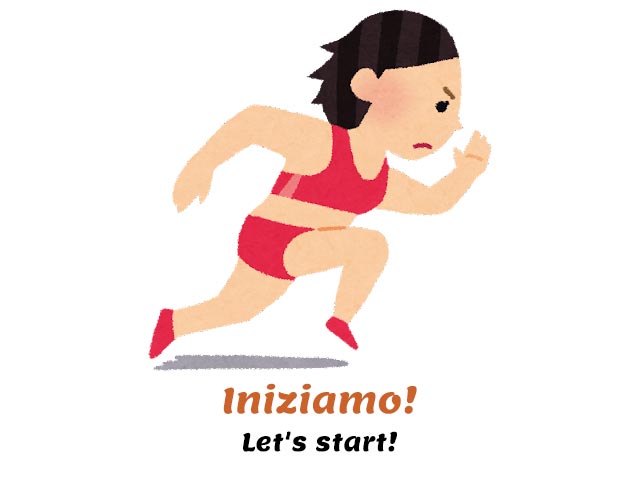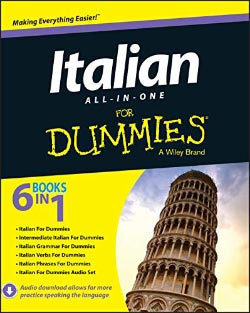What is the difference between dire and parlare in Italian? Are there any situations where you have to use one or the other? Are these verbs even interchangeable?
In this lesson, we will look at how to use these verbs with the help of many audio recordings and example sentences. Read on to learn all you need to know about the difference between dire and parlare!
Let’s get started! Iniziamo!

Dire and parlare in Italian
Many students confuse dire with parlare and vice versa. At first glance, these verbs are synonyms for “to say” and “to speak”. In reality, however, the difference between dire and parlare in Italian is very clear and they are not interchangeable.
Dire means “to say, to tell” and can act as both a transitive and an intransitive verb. It can be used in front of direct and indirect objects.
Dire
To say, to tell
Posso dirti una cosa?
Can I tell you something?
Parlare, on the other hand, means “to speak, to talk” and is an intransitive verb. It never precedes a direct object. Instead, it’s followed by a preposition con and the preposition di.
Parlare
To speak, to talk
Hai parlato con tuo fratello?
Have you talked to your brother?
Still confused about the difference between dire and parlare in Italian? Let’s take a closer look at each verb.

Title: Italian All-in-One For Dummies
Language: English / Italian
Publisher: For Dummies
Pages: 672
Learn to speak Italian like a native? Easy.
Italian All-in-One For Dummies appeals to those readers looking for a comprehensive, all-encompassing guide to mastering the Italian language. It contains content from all For Dummies Italian language instruction titles, including Italian For Dummies, Intermediate Italian For Dummies, Italian Verbs For Dummies, Italian Phrases For Dummies, Italian Grammar For Dummies, and Italian For Dummies Audio Set.
How do you use dire in Italian?
As we said, dire translates as to say and to tell. You simply tell something to someone else and you don’t expect a reply. Unlike parlare, dire can be a transitive verb, so it can precede a direct object as in…
Ti ho detto la verità, io non so niente del furto!
I told you the truth, I don’t know anything about the theft!
La verità is a direct object because it’s not introduced by a preposition. Now consider this example:
Ti ho detto di pulire camera tua!
I told you to clean up your room!
Note how we have a preposition, di, which introduces pulire. In this sentence, dire acts as an intransitive verb.

Here are some other examples:
Il dottore dice che dovrei dormire di più.
The doctor says I should get more sleep.
Avresti dovuto dirmelo prima.
You should have told me before.
Veronica mi ha detto di non entrare.
Veronica told me not to go inside.
Il mio istruttore di guida dice che dovrei essere più paziente.
My driving instructor says I should be more patient.

Some very common expressions with dire in Italian are…
- dire la verità, to tell the truth
- dire una bugia, to tell a lie
- dire di sì, to say yes
- dire di no, to say no
- dire senza peli sulla lingua, to tell sth without mincing words
How do you use parlare in Italian?
Parlare, unlike dire, is never used as a transitive verb. It has to be followed by a preposition or an adverb.
Another difference between dire and parlare in Italian is that parlare has a more general meaning of dire and it translates as to speak, to talk because it implies a chat between two or more people. It implies a reply.
For example, you could say…
Parli troppo velocemente.
You speak too fast.
Enrico sta parlando con la maestra.
Enrico is talking to the teacher.
Di cosa stai parlando?
What are you talking about?
Pay attention!
You can say dire qualcosa, to tell something. You can’t say parlare qualcosa, “to speak something”. However, you can say parlare di qualcosa, to speak about something.
An exception to this rule can be found in the popular expression parlare una lingua straniera, to speak a foreign language. Lingua straniera is a direct object.
Parlo inglese, francese e russo.
I speak English, French and Russian.
Quante lingue parli?
How many languages do you speak?

Some other common expressions with parlare in Italian are…
- parlare sottovoce, to whisper
- parlare a bassa voce, to speak softly
- parlare ad alta voce, to speak out loud
- parlare a gesti, to gesticulate, to speak with gestures
- parlare a vanvera, to talk nonsense
- parlare tra sé e sé, to talk to yourself
- parlare al telefono, to speak on the phone
- parlare del più e del meno, to speak about everything and anything
- parlare a monosillabi, to be tight lipped
FAQs on the difference between dire and parlare in Italian
What’s the difference between dire and parlare in Italian?
Dire is a transitive and an intransitive verb. It translates as “to say, to tell”.
Parlare is an intransitive verb and translates as “to talk, to speak”.
Is dire a regular verb?
No. Dire has an irregular root for many subject pronouns: DIC-. Io dico, tu dici, lui/lei dice, noi diciamo, voi dite, loro dicono.
Is parlare a regular verb?
Yes. It’s a regular -ARE verb: Io parlo, tu parli, lui/lei parla, noi parliamo, voi parlate, loro parlano.
Are dire and parlare interchangeable?
No, they are not.
And that’s the end of our lesson on the difference between dire and parlare in Italian!
What next?
Now that you’ve seen the difference between dire and parlare in Italian, you might want to keep learning Italian online with these free Italian resources:
❤️ If you liked this lesson on the difference between dire and parlare in Italian, consider sharing it with your social media friends who are also studying Italian.




